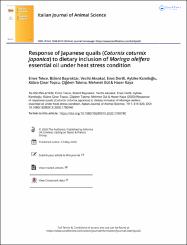| dc.contributor.author | Tekce, Emre | |
| dc.contributor.author | Bayraktar, Bulent | |
| dc.contributor.author | Aksakal, Vecihi | |
| dc.contributor.author | Dertli, Enes | |
| dc.contributor.author | Kamiloglu, Aybike | |
| dc.contributor.author | Topcu, Kubra Cinar | |
| dc.contributor.author | Kaya, Hacer | |
| dc.date.accessioned | 2020-10-26T12:24:34Z | |
| dc.date.available | 2020-10-26T12:24:34Z | |
| dc.date.issued | 2020 | |
| dc.identifier.issn | 1594-4077 | |
| dc.identifier.issn | 1828-051X | |
| dc.identifier.uri | https://doi.org/10.1080/1828051X.2020.1760740 | |
| dc.description.abstract | The present study was aimed at investigating the effects of the dietary use of different doses of Moringa oleifera essential oil (MOEO) on performance parameters, internal organ weights and meat quality in Japanese quails (Coturnix coturnix japonica) exposed to Heat Stress (HS). For this purpose, 320 male day-old quail chicks were used. Seven days of preliminary (physical exercise) and a 35-day fattening period were applied. The animals were divided into 8 groups, each including 40 animals according to temparature (C: 25 degrees C and SC: 37 degrees C) and dietary doses (C, 200, 400 and 600). Each group was divided into 4 subgroups, each comprising 10 animals. The consequences of this study showed that, in the stress-free (HSF) groups, while all of the different doses of dietary MOEO positively affected growth performance, feed intake and feed efficiency, in the HS groups, similar positive effects were observed with the use of 200 ppm of dietary MOEO. While no effect was detected on internal organ weights on Days 21 and 42 in the HSF and HS groups, a dose-dependent increase was determined in the intestinal pH value on day 42 in the HS group (p < .05). Additionally, in the analysis of meat quality on the 21st and 42 days compared to the controls, no effect was observed on the meat colour parameters value and TBARS level in the HS and HSF groups. Based on the consequences of this study, it is considered that, MOEO could be used as an alternative product in poultry, at a dose of 200 ppm, to reduce the detrimental effects of HS. | en_US |
| dc.description.sponsorship | Bayburt University Scientific Research Projects Coordination Department [2018/02-69001-02] | en_US |
| dc.description.sponsorship | This research has been supported by Bayburt University Scientific Research Projects Coordination Department. Project Number [2018/02-69001-02]. | en_US |
| dc.language.iso | eng | en_US |
| dc.publisher | Taylor & Francis Ltd | en_US |
| dc.relation.ispartof | Italian Journal of Animal Science | en_US |
| dc.rights | Attribution-NonCommercial-NoDerivs 3.0 United States | * |
| dc.rights | info:eu-repo/semantics/openAccess | en_US |
| dc.rights.uri | http://creativecommons.org/licenses/by-nc-nd/3.0/us/ | * |
| dc.subject | Thermal stress | en_US |
| dc.subject | performance parameters | en_US |
| dc.subject | meat colour | en_US |
| dc.subject | Moringa oleifera | en_US |
| dc.title | Response of Japanese quails (Coturnix coturnix japonica) to dietary inclusion of Moringa oleifera essential oil under heat stress condition | en_US |
| dc.type | article | en_US |
| dc.relation.publicationcategory | Makale - Uluslararası Hakemli Dergi - Kurum Öğretim Elemanı | en_US |
| dc.description.wospublicationid | WOS:000532584400001 | en_US |
| dc.description.scopuspublicationid | 2-s2.0-85085052700 | en_US |
| dc.department | Gümüşhane Üniversitesi | en_US |
| dc.identifier.volume | 19 | en_US |
| dc.identifier.issue | 1 | en_US |
| dc.identifier.startpage | 514 | en_US |
| dc.identifier.doi | 10.1080/1828051X.2020.1760740 | |
| dc.identifier.endpage | 523 | en_US |
| dc.authorwosid | Dertli, enes / AAZ-4384-2020 | |
| dc.authorwosid | Bayraktar, Bulent / AAI-8145-2021 | |
| dc.authorwosid | Gul, Mehmet / ABI-5189-2020 | |
| dc.authorscopusid | 57192937944 | |
| dc.authorscopusid | 57212514049 | |
| dc.authorscopusid | 7801663598 | |
| dc.authorscopusid | 36815706500 | |
| dc.authorscopusid | 57205422641 | |
| dc.authorscopusid | 57216860401 | |
| dc.authorscopusid | 6506660805 | |




















